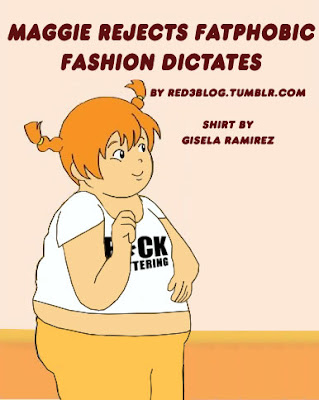The
#thingsfatpeoplearetold hash tag is still tearing it up over at Twitter with over 1,400 tweets and retweets as of this writing. I'm so grateful for the courage its taken so many people to share what are often very raw experiences with entitled fat stigmatization. To be clear, some of this can be trigging given how brutally honest the experiences are, but I want to share some of the Tweets here. I can't stress enough that these are just some of what people are sharing. Follow
#thingsfatpeoplearetold to know you really aren't alone or to learn what fat people are really experiencing.
@
mymilkspilt: Your body sends a bad message to your children. #thingsfatpeoplearetold @red3blog
Apr 9, 2011 10:20 PM GMT
@
TheRotund: @mymilkspilt Your chronic illness would disappear if you lost weight. #thingsfatpeoplearetold
Apr 9, 2011 10:31 PM GMT
@
MargitteLeah: "no one will ever love you." actual #thingsfatpeoplearetold
Apr 9, 2011 10:34 PM GMT
@
BookMD: Fat people are stupid. If they were smart, they wouldn't be fat. #thingsfatpeoplearetold
Apr 9, 2011 11:58 PM GMT
@
Fatheffalump: Telling anyone that it's ok to be fat makes you personally responsible for their death #thingsfatpeoplearetold
Apr 10, 2011 12:45 AM GMT
@
elizabethgallo: You have such a pretty face... #thingsfatpeoplearetold
Apr 10, 2011 12:56 AM GMT
(Brian: This may seem like a cliché, but it came up repeatedly. Fat people really do hear this. A lot.)@
_FatWaitress_: They probably didn't give you a promotion because you might not fast enough to do the job. #thingsfatpeoplearetold
Apr 10, 2011 01:06 AM GMT
@
katejames: "You're not fat!" (Meaning: I know & like you, you're not like those *other* lazy smelly greedy fat people.) #thingsfatpeoplearetold
Apr 10, 2011 01:16 AM GMT
@
Living400lbs: But have you really, really TRIED to lose weight? #thingsfatpeoplearetold
Apr 10, 2011 02:22 AM GMT
@
sweetnfat: Would you even feel my touch through all your fat? #thingsfatpeoplearetold
Apr 10, 2011 02:30 AM GMT
@
princessnowhere: "You should try going on The Pill [to lose weight]" Seriously. I wish I was kidding. #thingsfatpeoplearetold
Apr 10, 2011 02:31 AM GMT
@
AmadiTalks: In hospital for serious illness: "You should get weight loss surgery, so long as you're here." #thingsfatpeoplearetold
Apr 10, 2011 02:34 AM GMT
@
etamny: We can't show you on TV because that would be endorsing the fact that you exist. #thingsfatpeoplearetold
Apr 10, 2011 02:36 AM GMT
@
AmadiTalks: From the window of a passing car: Mooooooooooooooooooooooooooooooooooo! #thingsfatpeoplearetold
Apr 10, 2011 02:40 AM GMT
(Brian: Another one that was repeated many times was slurs yelled from passing cars.)@
meag26: From my doc, when I explain how healthy my lifestyle is: "well obviously you're doing SOMETHING wrong." #thingsfatpeoplearetold
Apr 10, 2011 02:52 AM GMT
@
liveonce_juicy: Unrelenting stomach pain and constant puking? Take two diets and call me when you aren't fat anymore. #thingsfatpeoplearetold
Apr 10, 2011 02:56 AM GMT
@
kiddotrue: "He didn't get you candy for Valentine's Day, did he? You don't need it." #thingsfatpeoplearetold
Apr 10, 2011 03:05 AM GMT · via Twitter for Android · Reply · View Tweet
@
AmadiTalks: Asked for sugar for coffee in a restaurant, got artificial sweetener instead. "Here, you need to use this." #thingsfatpeoplearetold
Apr 10, 2011 03:07 AM GMT
@
kiddotrue: "you should lose weight and get a boyfriend." #thingsfatpeoplearetold (when they're 12 and at their first gyno visit. in the stirrups.)
Apr 10, 2011 03:09 AM GMT
@
MargitteLeah: "I won't treat you until you've lost 50 lbs." #thingsfatpeoplearetold by medical professionals
Apr 10, 2011 03:10 AM GMT
@
_FatWaitress_: Are you sure you didn't just imagine them checking you out? #thingsfatpeoplearetold
Apr 10, 2011 03:27 AM GMT
@
AmadiTalks: In the back of an ambulance, by a police officer: "Who would rape you?" #thingsfatpeoplearetold
Apr 10, 2011 03:28 AM GMT
@
MamaBrownBear: "how did you get pregnant? You are too fat to get knocked up" #thingsfatpeoplearetold
Apr 10, 2011 03:45 AM GMT
@
fatlazyceliac: Oh, it's so great you're allergic to gluten - not eating it is supposed to help you lose weight! #thingsfatpeoplearetold
Apr 10, 2011 03:50 AM GMT
@
Fatheffalump: "Go away, lose weight, find a boyfriend and come back to me when you want babies." (a Dr to me, aged 19 & in pain) #thingsfatpeoplearetold
Apr 10, 2011 04:07 AM GMT
@
ginamariewade: #thingsfatpeoplearetold - You're too fat to have a baby, and if I'd had anything to do about it, you wouldn't be having this one. from my MD
Apr 10, 2011 04:11 AM GMT
@
mskozlowski: We don't carry bras for PEOPLE LIKE YOU. #thingsfatpeoplearetold #Victoria'sSecretemployeesaidthistome
Apr 10, 2011 04:12 AM GMT
@
ginamariewade: #thingsfatpeoplearetold If you don't lose weight, your child will never love you. (also from my MD)
Apr 10, 2011 04:15 AM GMT
@
redheadedgirl: Why would anyone want to fuck you? #thingsfatpeoplearetold
Apr 10, 2011 04:18 AM GMT
@
ginamariewade: #thingsfatpeoplearetold If I looked like you I'd kill myself.
Apr 10, 2011 04:19 AM GMT
@
girlndocs: We know your kidneys are failing and you may die but you can't get on the transplant list until you lose weight. #thingsfatpeoplearetold
Apr 10, 2011 04:19 AM GMT
@
etamny: We'll sell you clothes, but we can't have you in our stores. #thingsfatpeoplearetold [Hi, Old Navy! Hi, J. Jill!]
Apr 10, 2011 04:23 AM GMT
@
Quiara: Your blood pressure and blood sugar are fine, but if you don't lose weight you'll be diabetic & hypertensive soon. #thingsfatpeoplearetold
Apr 10, 2011 04:24 AM GMT
@
TheRotund: You're a symbol of America's overconsumption and the evils of capitalism. #thingsfatpeoplearetold
Apr 10, 2011 04:27 AM GMT
@
ravengeary: How do you, you know, have sex? #ThingsFatPeopleAreTold
Apr 10, 2011 04:29 AM GMT
@
fatandtheivy: You're diseased #thingsfatpeoplearetold
Apr 10, 2011 04:33 AM GMT
@
mskozlowski: Your boyfriend must be really into your mind (not your body). #thingsfatpeoplearetold
Apr 10, 2011 04:34 AM GMT
@
sarahnbay: Did you not realize they're called "skinny" jeans? #thingsfatpeoplearetold
Apr 10, 2011 04:37 AM GMT
@
AmadiTalks: At an mentorship program for at-risk girls: "You aren't a good fit, our girls need positive role models." #thingsfatpeoplearetold
Apr 10, 2011 04:47 AM GMT
@
hungrylikewolf: You obviously can't be telling the truth about what you eat. #ThingsFatPeopleAreTold
Apr 10, 2011 04:49 AM GMT
@
MuseofIre: Sure it has dangerous side effects, but it's better than being fat. #thingsfatpeoplearetold
Apr 10, 2011 05:06 AM GMT
@
Dresswhore: Yes it could help w/your period but I can't in good conscience put you on the pill b/c you might gain weight. #thingsfatpeoplearetold
Apr 10, 2011 05:18 AM GMT
@
shonias: At least the terrible illness you've just had has made you lose weight. #thingsfatpeoplearetold
Apr 10, 2011 05:21 AM GMT
@
red3blog: "Take this fat out while we are in here" -Surgeon during a C-Section #thingsfatpeoplearetold
Apr 10, 2011 06:22 AM GMT
@
hungrylikewolf: Come on, why don't you want to go shopping with me? You can always check out the accessories. #thingsfatpeoplearetold
Apr 10, 2011 07:30 AM GMT
@
Xhollzy: "I'm not going to show you the room, I need the people I rent to to be healthy."- with one look at me #thingsfatpeoplearetold
Apr 10, 2011 08:50 AM GMT
@
annacaronz: If you were thin you wouldn't need to be gay any more #thingsfatpeoplearetold
Apr 10, 2011 09:06 AM GMT
@
JonelB: You would stop getting bullied if you just lost weight. #thingsfatpeoplearetold
Apr 10, 2011 09:21 AM GMT
@
Beezelbubbles: Don't you just hate what you see when you look in the mirror? #thingsfatpeoplearetold #mymomsgreatesthits #yesreally
Apr 10, 2011 09:41 AM GMT
@
Beezelbubbles: You twisted your ankle playing tennis? You should really lose some weight and exercise more. #thingsfatpeoplearetold #butiwasexercising
Apr 10, 2011 09:50 AM GMT
@
WeightlessOne: If you don't lose weight you'll be dead before you're 30. #thingsfatpeoplearetold (told to a 16 yr old me by a new doc-I'm 38 now)
Apr 10, 2011 01:27 PM GMT
@
FatVeganCommie: Yes, you are perfectly heathy. Have you considered bariatric surgery?" #thingsfatpeoplearetold
Apr 10, 2011 02:24 PM GMT
@
AbigailNussey: You really need a kidney transplant/knee replacement/other surgery. But you can't get it until you lose 60 lbs. #thingsfatpeoplearetold
Apr 10, 2011 03:10 PM GMT
@
thepiouswench: I don't think we carry your size. (Sales associate, before I've specified what I'm looking for or given my size). #thingsfatpeoplearetold
Apr 10, 2011 03:44 PM GMT
@
Lyrical_Huldra: "I don't know why you bother. You're so fat you look awful no matter what you wear." #thingsfatpeoplearetold #bymymother
Apr 10, 2011 03:51 PM GMT
@
RaisingBoychick: "You're too fat to deliver vaginally." #thingsfatpeoplearetold
Apr 10, 2011 05:29 PM GMT · via Twitter for iPhone · Reply · View Tweet
@
AmadiTalks: "You're too wide/heavy for our equipment so you can't get this important medical procedure." #thingsfatpeoplearetold
Apr 10, 2011 05:48 PM GMT
@
zaftigvegan: "There's no point in doing any physio on your knees if you're not willing to lose weight." #thingsfatpeoplearetold
Apr 10, 2011 05:48 PM GMT
@
zaftigvegan: "That can't be right." #thingsfatpeoplearetold (a nurse checking my blood pressure [normal] for the third time)
Apr 10, 2011 05:50 PM GMT
@
cinnamaldehyde: #thingsfatpeoplearetold if you'd just lose a little weight, your disabilities would go away.
Apr 10, 2011 05:51 PM GMT
@
zaftigvegan: "If you were *really* comfortable in your body, the ignorant things people say about fat wouldn't bother you." #thingsfatpeoplearetold
Apr 10, 2011 05:57 PM GMT
@
zaftigvegan: "You *can't* be fat, healthy and happy. You're in denial. You're putting other fat ppl at risk by promoting HAES." #thingsfatpeoplearetold
Apr 10, 2011 06:01 PM GMT
@
notinseason: All fat patients will lie about their diet and exercise. #thingsfatpeoplearetold #thingsivelearnedinmedschool
Apr 10, 2011 06:01 PM GMT
@
FatVeganCommie: We can't date, but we can secretly have sex. #thingsfatpeoplearetold
Apr 10, 2011 06:09 PM GMT
@
red3blog: We will only learn how to perform anesthesia on you for weight loss surgery. #thingsfatpeoplearetold
Apr 10, 2011 06:35 PM GMT
@
HiddenTohru: "I imagined that weight as someone who can't even get out of bed." #thingsfatpeoplearetold (by a coworker when I told her I was 380 lbs)
Apr 10, 2011 07:45 PM GMT
@
mymilkspilt: You're so selfish. You're going to die and leave your kid without a mother. #thingsfatpeoplearetold
Apr 10, 2011 07:48 PM GMT
@
no_oneimportant: You must have a really hard time having sex with your belly getting in the way. #thingsfatpeoplearetold also #liespeopletell
Apr 10, 2011 08:08 PM GMT
@
MissSuperfluous: #thingsfatpeoplearetold You're not quite this store's demographic.
Apr 10, 2011 10:11 PM GMT
@
kawaiimarti: You don't have to pretend to be happy with yourself to me. I know it can't be true. #thingsfatpeoplearetold
Apr 10, 2011 10:17 PM GMT














